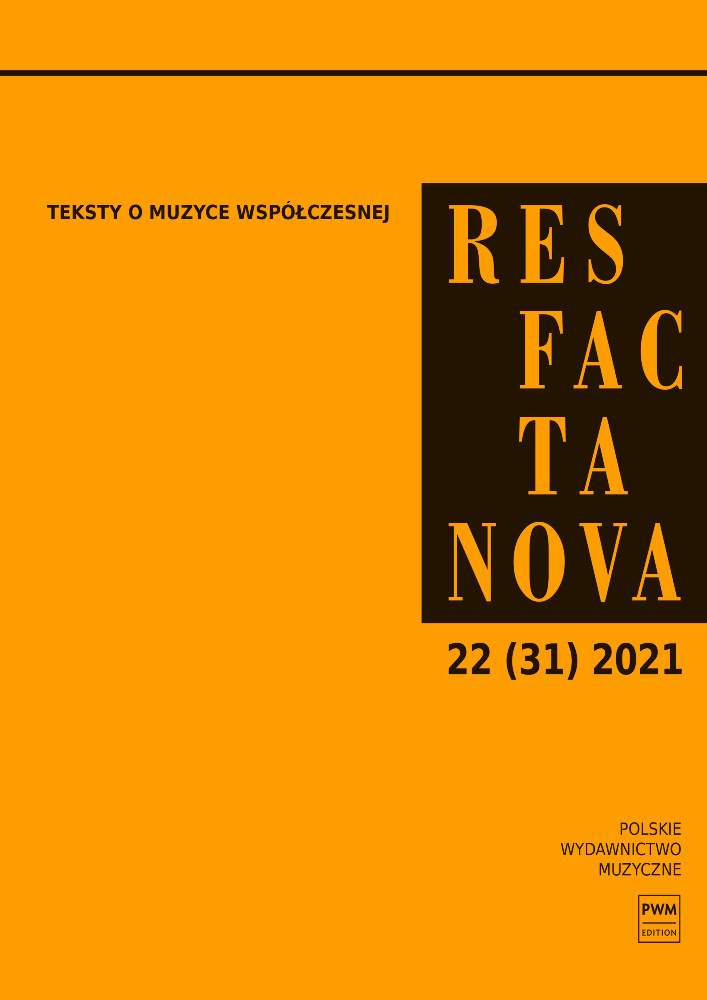Abstrakt
The article is an invitation to reflect on the theme of money and the role of economic incentives in the creative act. Pointing to the abundant presence of the theme of money in opera plots, the author proposes to study the economics of creativity of particular composers taking account of the various valuations of money expressed in their works. The ground for such reflection is set forth by the comparison of two operas that express two extreme views on money and its role for creativity: Gioacchino Rossini’s The Barber of Seville and Richard Wagner’s The Ring of the Nibelung. Comparing different ways in which Figaro and Alberich approach money provides a starting point for the comparison of two creative acts that can be found in the two works: Figaro’s invention of a creative solution for Almaviva’s problem (affirmation of money) and Siegfried’s forging of a sword accompanied by Mime’s efforts to make a sleeping potion (rejection of money). The analysis of the musical form of the two scenes, however, shows the indebtedness of Wagner to Rossini. Although Wagner openly rejects the musical principles of his Italian predecessor, the dramaturgy of his music is based on the dramaturgical formulas developed in Italian operas. The two approaches towards money can be linked to the opposing views of Adam Smith and Karl Marx regarded as fathers of the classical and Marxian schools of political economy. Thus, the two operas can be seen as border posts of the territory in which music and economy intersect.
Bibliografia
Berger Karol, Beyond Reason: Wagner contra Nietzsche, University of California Press, Oakland 2017.
Dietrichson Jan W., The Image of Money in the American Novel of the Gilded Age, Universitetsforlaget, Humanities Press, Oslo–New York 1969.
Fix Florence, Voisin-Fougère Marie-Ange, L’argent et le rire: de Balzac à Mirbeau, Presses universitaires de Rennes, Rennes 2012.
Lamacchia Saverio, Il vero Figaro o sia il falso factotum. Riesame di „Barbiere” di Rossini, De Sono, Torino 2008.
Leigh John, The Search for Enlightenment: Introduction to Eighteenth-Century French Writing, Duckworth–London 1999.
Lynch Deidre, The Economy of Character: Novels, Market Culture, and the Business of Inner Meaning, University of Chicago Press, Chicago 1998.
Mathew Nicholas, Interesting Haydn: On Attention’s Materials, „Journal of American Musicological Society” 2018, t. 71, nr 3, s. 655–701.
Mathew Nicholas, Out of Circulation Beethoven, ‘Hat man nicht auch Gold beineben’ (Rocco), Fidelio, Act I, „Cambridge Opera Journal” 2016, t. 28, nr 2, s. 145–148.
Money: Lure, Lore, and Literature, ed. John Louis DiGaetani, Greenwood Press, Westport, Connecticut 1994.
Berger Karol, Beyond Reason: Wagner contra Nietzsche, University of California Press, Oakland 2017. https://doi.org/10.1525/california/9780520292758.001.0001 DOI: https://doi.org/10.1525/california/9780520292758.001.0001
Dietrichson Jan W., The Image of Money in the American Novel of the Gilded Age, Universitetsforlaget, Humanities Press, Oslo-New York 1969.
Fix Florence, Voisin-Fougère Marie-Ange, L'argent et le rire: de Balzac à Mirbeau, Presses universitaires de Rennes, Rennes 2012. https://doi.org/10.4000/books.pur.54165 DOI: https://doi.org/10.4000/books.pur.54165
Lamacchia Saverio, Il vero Figaro o sia il falso factotum. Riesame di "Barbiere" di Rossini, De Sono, Torino 2008.
Leigh John, The Search for Enlightenment: Introduction to Eighteenth-Century French Writing, Duckworth-London 1999.
Lynch Deidre, The Economy of Character: Novels, Market Culture, and the Business of Inner Meaning, University of Chicago Press, Chicago 1998.
Mathew Nicholas, Interesting Haydn: On Attention's Materials, "Journal of American Musicological Society" 2018, t. 71, nr 3, s. 655-701. https://doi.org/10.1525/jams.2018.71.3.655 DOI: https://doi.org/10.1525/jams.2018.71.3.655
Mathew Nicholas, Out of Circulation Beethoven, 'Hat man nicht auch Gold beineben' (Rocco), Fidelio, Act I, "Cambridge Opera Journal" 2016, t. 28, nr 2, s. 145-148. https://doi.org/10.1017/S0954586716000136 DOI: https://doi.org/10.1017/S0954586716000136
Money: Lure, Lore, and Literature, ed. John Louis DiGaetani, Greenwood Press, Westport, Connecticut 1994.
Poovey Mary, Mediating Value in Eighteenth- and Nineteenth-Century Britain, University of Chicago Press, Chicago 2008. https://doi.org/10.7208/chicago/9780226675213.003.0003 DOI: https://doi.org/10.7208/chicago/9780226675213.003.0003
Rowlinson Mathew, Real Money and Romanticism, Cambridge University Press, Cambridge 2010.
Scherer Frederic, Quarter Notes and Bank Notes: The Economics of Music Composition in the Eighteenth and Nineteenth Centuries, Princeton University Press, Princeton-Oxford 2004. https://doi.org/10.1515/9780691188096 DOI: https://doi.org/10.1515/9780691188096
Tusa Michael, Mime, Meyerbeer and the Genesis of Der junge Siegfried: New Light on the 'Jewish Question' in Richard Wagner's Work, "Cambridge Opera Journal" 2014, t. 26, nr 2, s. 113-146. https://doi.org/10.1017/S0954586714000019 DOI: https://doi.org/10.1017/S0954586714000019
Vernon John, Money and Fiction: Literary Realism in the Nineteenth and Early Twentieth Centuries, Cornell University Press, Ithaca 1984.Wagner. Kompendium. Przewodnik po życiu i twórczości kompozytora, red. Barry Millington, tłum. Weronika Jarzyńska, Anna Mikołajczak, Rafał Monita et al., Astraia, Kraków 2014.
Wagner Richard, Opera i dramat, cz. 1: Opera a istota muzyki, tłum. Marian Dienstl, H. Altenberg, E. Wende i Sp., Lwów-Warszawa 1907.
Wagner Richard, Sämtliche Briefe, hrsg. Gertrud Strobel, Werner Wolf, t. 3, Deutscher Verlag für Musik VEB, Leipzig 1975.
Licencja
Prawa autorskie (c) 2021 Paweł Siechowicz

Utwór dostępny jest na licencji Creative Commons Uznanie autorstwa – Użycie niekomercyjne – Bez utworów zależnych 4.0 Międzynarodowe.

